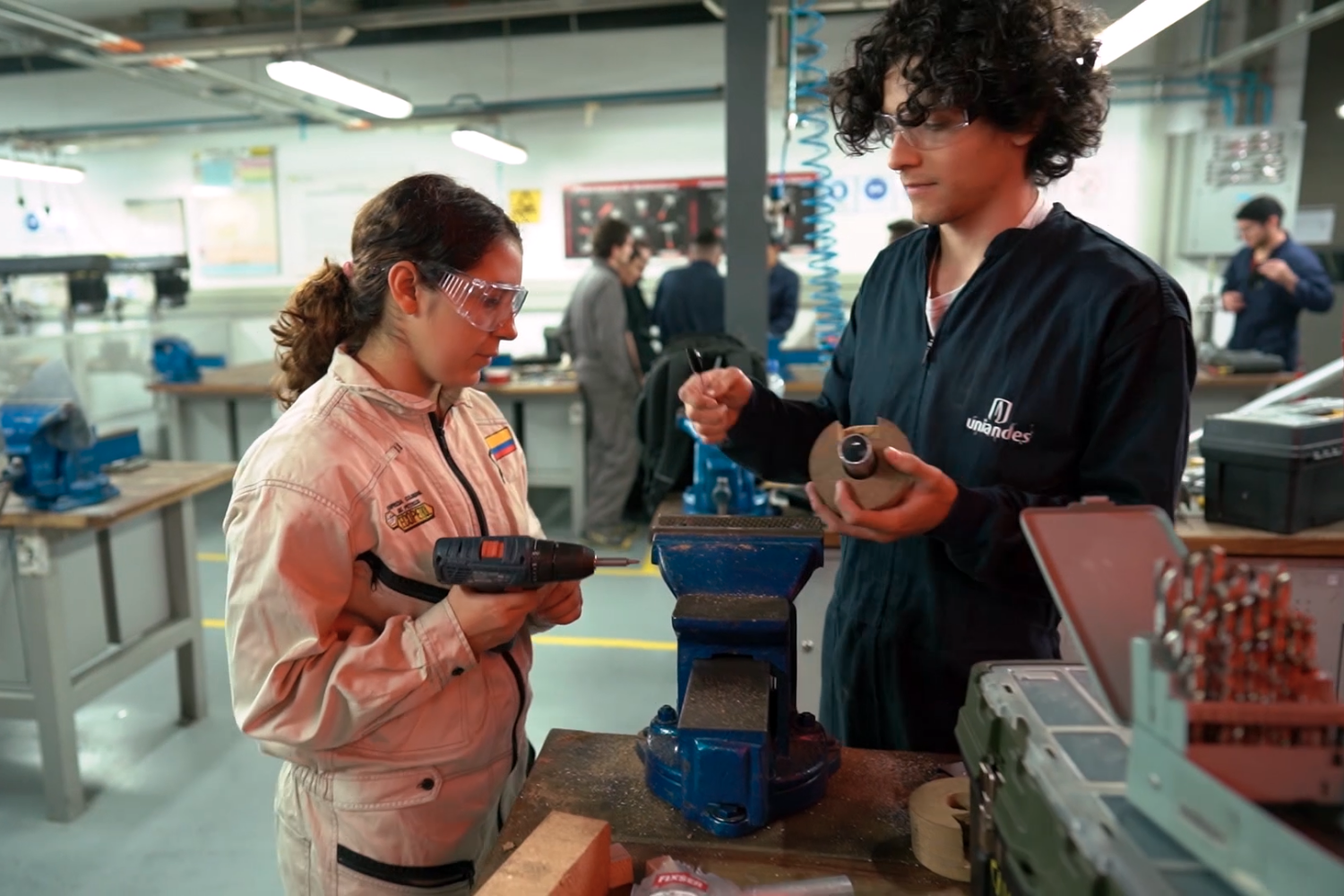
A three-year collaboration with J-WEL upgraded student learning through human skills, project-centered classes, and adaptability.
MIT Open Learning
Nestled in the foothills of Bogotá, the University of the Andes (Uniandes) draws students across Colombia who are looking to study engineering. Today, those graduates are better equipped than ever, thanks to a comprehensive redesign of the university’s undergraduate engineering curriculum, inspired in part by its relationship with MIT’s Abdul Latif Jameel World Education Lab (J-WEL).
Leveraging its affiliate membership with J-WEL over the course of several years, Uniandes connected its senior university leaders, faculty, and staff to MIT ideas and experience as part of an ongoing interaction that helped fuel the Colombian university’s systematic reimagining of engineering education. Now that it’s in place, the refined curriculum is already making an impact on students and is inspiring redesign efforts in other departments at Uniandes.
J-WEL associate director for membership Julia Reynolds-Cuéllar reflects: “Uniandes is a valued member of our community. Leaders of their curriculum redesign efforts have provided ongoing insights for J-WEL members and have been active in ensuring lessons learned are widely shared — a critical part of J-WEL’s mission.”
Redesigning the curriculum at Uniandes was a three-year iterative process that interleaved ideas, research, design, and implementation to land at a practical and relevant overhaul of engineering education. The private research university was one of the first to join J-WEL in 2018, shortly after the launch of the MIT-led collaboration designed to create a platform for educational institutions to share their ideas and innovations while engaging with MIT faculty and staff experts. This design has proved fruitful. Luis Alejandro Camacho Botero, associate professor of civil and environmental engineering at Uniandes says, “It’s very important for different schools of engineering around the world to be connected and to know what others are doing, and that will help us to do it better.”
Uniandes leaders joined their peers in exploring wide-scale policy-level transformation in education through J-WEL programs with such themes as “The Problem-solving Campus,” “Strategic Planning,” “Computing Everywhere,” and “Building a University-Led Innovation Ecosystem.” Drawing on these ideas, Uniandes faculty redesigned their courses in real time. To land at the practical changes they sought, faculty and staff honed their ideas by participating in J-WEL’s hands-on workshops on course design, launching interdisciplinary programs, blended learning, and integrating human skills.
The J-WEL team helped Uniandes by focusing their offerings on how to teach with project-based action learning so students could actively link their classroom learning to the work they do in the field. Today, many Uniandes engineering classes incorporate interactions with external partners, bringing ideas and problems from the nonprofit sector, industry, governmental agencies, and local communities into the curriculum. A second key way in which Uniandes faculty harnessed MIT-led ideas was by incorporating human skills into engineering classes, building capabilities for communication with multiple audiences, working with multidisciplinary teams, and understanding the social, environmental, and ethical impact of technical solutions.
“There are many innovative components of our new undergraduate engineering programs. We have project-based courses located throughout the curriculum. We are also promoting different learning spaces, so students can develop teamwork, leadership, communication, and creativity skills,” says Silvia Caro, vice president for academic affairs at Uniandes. “Students will graduate not only with technical, but also transversal skills, to be able to work with others and propose solutions to the challenges of the future.”
As Uniandes gained insights from MIT and other institutions, the university quickly became a leader and model for other J-WEL members by sharing insights into their work as the redesign unfolded. Such sharing has emerged as a critical aspect of the J-WEL community. During a 2020 virtual gathering dubbed J-WEL Connections, leaders of Uniandes’ curriculum reform effort identified five key lessons for their counterparts:
- Do not rush the process. Time and patience are needed.
- Respect the rhythms of different departments, but also communicate expected results and deliverables.
- Provide clear guidelines and understand restraints, so they can be considered throughout the rest of the process.
- Promote reflections and spaces for discussion within each department and across the larger school level. This may include engaging with stakeholders outside of the university.
- Get faculty deeply engaged and excited about the process from the beginning by providing space for different pedagogical reflections.
Uniandes’ drive to share their insights has shaped J-WEL’s own evolution. In 2019, a team of J-WEL experts visited the Bogotá campus for a joint workshop designed to enable the next steps in their curriculum reform efforts. Uniandes seized the opportunity to take their insights further by organizing an additional workshop to reach 13 universities from throughout Colombia’s Caribbean coastal region, ensuring that Uniandes’ learning was shared widely with others. Both sets of workshops succeeded in inspiring ongoing efforts across the country, a testament to the value of J-WEL’s goal of wide-scale transformation sparked by the innovations undertaken by its partners in the setting.
Now that it has redesigned its engineering curriculum, Uniandes is committed to keeping its teaching approaches current through frequent review, adaptations, and inputs from the field. Rubby Casallas Gutiérrez, dean of the school of engineering, summarizes her institution’s commitment to preparing students for a lifetime of learning and impact: “The world is changing at a higher speed than ever before and engineers will need to respond to those changes. This also means that our current students will need to recognize the importance of lifelong learning, that they will need to continue acquiring new skills after they graduate.”
